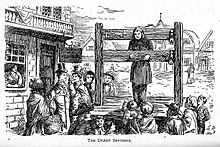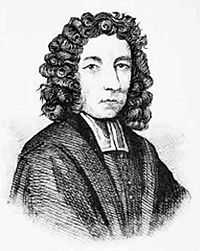Benjamin Keach
| ||||||||
Benjamin Keach (29 February 1640 – 18 July 1704) was a Particular Baptist preacher in London whose name was given to Keach's Catechism.[1]
Biography
Originally from Buckinghamshire, Keach worked as a tailor during his early years. He was baptized at the age of 15 and began preaching at 18. He was the minister of the congregation at Winslow before moving in 1668 to the church at Horse-lie-down, Southwark where he remained for 36 years as pastor (1668-1704). This congregation later became the New Park Street Church and then moved to the Metropolitan Tabernacle under the pastorship of Charles Spurgeon.

It was as representative of this church that Keach went to the 1689 General Assembly and subscribed the 1689 London Baptist Confession of Faith. Keach was one of the seven men who sent out the invitation to the 1689 General Assembly. The signing of the confession was no mute doctrinal assent on the part of the church, for in the same year they entered into a Solemn Covenant which reflected, at the practical and congregational level, some of the doctrines of the confession. There was a secession from Horse-lie-down in 1673 and the Old Kent Road congregation was formed. Spurgeon later republished the 1689 London Baptist Confession of Faith for use in the congregation.
Keach wrote 43 works, of which his "Parables and Metaphors of Scripture" may be the best known. He wrote a work entitled "The Child's Instructor" which immediately brought him under persecution and he was fined and pilloried in 1664. He is attributed with the writing of a catechism commonly known as "Keach's Catechism", although it is most likely that the original was compiled by William Collins.
| “ | On the pillory at Aylesbury Mr. Keach defended himself and the truth with great boldness. The jailer frequently interrupted him. and finally the sheriff himself threatened to have him gagged. The people, contrary to custom, had no words of mockery for the good, persecuted minister, and no offensive missile was hurled at him. An Episcopal minister who ventured to assail Mr. Keach in the pillory was immediately reproached by the people with the ungodliness of his own life, and his voice was drowned in laughter. At Winslow, where he lived, he suffered the same shameful penalty, and a copy of his little book was burned. | ” |
Keach is also known to have promoted the introduction of hymn singing in the Baptist churches.[2]
| Part of a series on |
| Baptists |
|---|
 |
|
Background
|
|
|
|
Organizations
|
| Baptist portal |
His church, Horslydown, was probably the first church in England to sing hymns, as opposed to psalms and paraphrases. Keach’s hymnbook, published in 1691, provoked heated debate in the 1692 Assembly of Particular Baptists.
Among his eschatological convictions, Keach anticipated a major revival amongst the Jews at the end of this age.[3]
References
- ↑ Cathart (1881), p. 637-638
- ↑ Benjamin Keach Biography from Spurgeon's Autobiography
- ↑ Keach, Benjamin (1698). "The Display of Glorious Grace:The Covenant of Peace Opened: Sermon 1, Isaiah 54.10 Latter Part." (PDF). Published Sermons. Archived from the original (PDF) on 2015-04-01. Retrieved 2015-03-28.
- Cathart, William (1881). The Baptist Encyclopaedia. Philadelphia: Everts.
External links
- Information on Benjamin Keach at the Christian History Institute
- A quotation from Keach's The Child's Instructor, 'the first Baptist textbook'
| Religious titles | ||
|---|---|---|
| Preceded by William Rider |
Pastor of the Baptist Church at Horse-lie-down 1668-1704 |
Succeeded by Benjamin Stinton |
|
